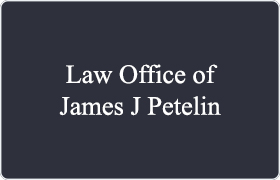EAVESDROPPING
Listening to conversations or observing conduct which is meant to be private, typically by using devices that amplify sound or light, such as stethoscopes or bi...
(more...)Listening to conversations or observing conduct which is meant to be private, typically by using devices that amplify sound or light, such as stethoscopes or binoculars. The term comes from the common law offense of listening to private conversations by crouching under the windows or eaves of a house. Nowadays, eavesdropping includes using electronic equipment to intercept telephone or other wire communications, or radio equipment to intercept broadcast communications. Generally, the term 'eavesdropping' is used when the activity is not legally authorized by a search warrant or court order; and the term 'surveillance' is used when the activity is permitted by law. Compare electronic surveillance.
 x
x

 James Petelin Chico, CA
James Petelin Chico, CA AboutLaw Office of James J Petelin
AboutLaw Office of James J Petelin Practice AreasExpertise
Practice AreasExpertise
